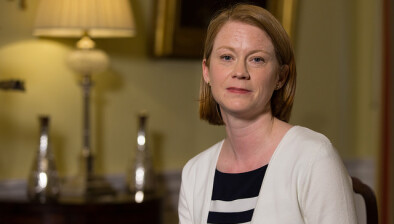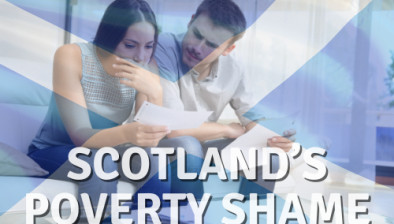Reform Scotland: Scottish Child Payment ‘hasn’t reduced child poverty’

The Scottish Child Payment needs to be rethought with higher priority given to prevention, place-focused interventions and addressing the circumstances and needs of the most vulnerable and poorest families, according to Scotland’s former social justice minister.
In a paper published by Reform Scotland, Des McNulty argues that over the period 2017-24, the Scottish Government strategy and plans directed towards reducing child poverty narrowed in focus, with cash interventions prioritised as the core mechanism to drive progress.
In the paper, ‘Tackling Child Poverty in Scotland: Striking the Right Balance’, Mr McNulty argues that:
- From 2011-2014 the Scottish Government’s Child Poverty Strategy focused on early intervention and prevention, advocating (i) an asset- rather than deficit-based approach and (ii) ensuring that children and families’ needs are at the centre of service design and delivery.
- From 2014-2017 the child poverty strategy was ambitious in scope, recognising the range of contributory factors to be addressed. It identified three priorities: the 3Ps of Pockets (aimed to reduce income poverty and material deprivation), Prospects (aimed to break inter-generational cycles of poverty, inequality and deprivation) and Places (seeking to address area-based factors which exacerbate the effects of individual poverty for many families by continuing to improve the physical, social and economic environments in local areas, particularly in those areas of multiple deprivation in which child poverty is most prevalent and most severe).
- After legislative child poverty reduction targets were set in The Child Poverty Act (Scotland) 2017, the Cabinet Secretary for Communities, Social Security and Equalities stated in the Child Poverty Delivery Plan 2018, Every Child Every Chance (ECEC) that tackling child poverty was ‘fundamentally about lack of income’. In practice, this meant a shift away from the 2014-17 causal connections towards a narrower approach, in which the three drivers of poverty were identified as insufficient income from employment; insufficient income from social security; and the rising cost of living.
While the subsequent child poverty delivery plan Best Start, Bright Futures (2022) includes measures aimed at helping parents into work and increased childcare, funding for these and other interventions has been pared back. The Scottish Government has doubled down on income supplements, extending eligibility and increasing amounts paid through Scottish Child Payment (which currently costs £460 million) while allocating much smaller amounts towards early intervention and prevention in those places and amongst population groups where there is the greatest disadvantage (and deepest poverty).
While income is undoubtedly important, McNulty argues that where resources are scarce, a more effective and fairer way of addressing the complex roots of poverty and its worst consequences is by empowering and sustainably funding local partners to work more closely with the most vulnerable and poorest families, helping them on their journey.
Des McNulty, former social justice minister, said: “The Scottish Government narrowed its focus on child poverty policy to one based primarily on income, aimed at meeting legislative targets, with the effect that measures are driving policy rather than the reverse.
“Scottish Child Payment was intended as a quick fix, because targets were not being met, but it did not deliver the expected reductions in child poverty. Eligibility was extended in 2022 and the amount paid has more than doubled but child poverty levels in Scotland last year went up rather than down.
“Because income supplement policies support such a high proportion of families with children, they are costly. As a flat rate payment per child, Scottish Child Payment does not take account of family circumstances - it is therefore inadequately targeted at the needs of the most vulnerable household types or at those places and communities where poverty is transmitted through the generations.
“Equating household income with need does not take sufficient account of the consequences for children’s life chances of growing up in areas of multiple deprivation or living in families affected by complex needs which require differentiated responses if fairness and efficacy are to be achieved.
“The 2017 report by advisor to the FM Naomi Eisenstadt and recent research carried out by Scottish Government analysts highlights the importance of prevention, place-focused interventions and better integrated support for children and parents. This is confirmed by evidence from Glasgow which demonstrates the benefits of strength-led approaches and multi-agency co-ordination at local level, supporting families on their journeys out of poverty.
“Central government should reconsider its priorities in tackling child poverty and its measures of success, balancing better targeting of support through the social security system and direct payments with empowering (and sustainably funding) local government and its partners if preventative, holistic and integrated support is to be more effectively designed and delivered to those families and children in greatest need.
“Tackling child poverty should be at the heart of the public service reform agenda in Scotland. Progress requires dialogue and collaboration between different tiers of government, streamlining and simplification of regulation and monitoring arrangements, better targeting of resources on clearer objectives and a relentless focus on reducing demand through prevention. Why not start implementing the Christie principles by applying them to the over-riding priority of the Scottish Government, one which has cross-party and widespread popular support?”
Chris Deerin, director of Reform Scotland, said: “A focus on tackling child poverty has been a defining characteristic of the SNP’s recent years in power. The creation of Scottish Child Payment, in particular, has attracted wide support across the political spectrum in Scotland and from anti-poverty campaigners north and south of the border.
“Few would dispute the government’s good intentions or claim that combating child poverty is the wrong place for ministers to expend energy and deploy finances. But it is also crucial that the methods they use in doing so are carefully examined for their effectiveness. Scotland must do better at understanding outcomes as well as celebrating inputs.
“Des McNulty’s paper is important, painstakingly researched work, which should inform future decisions not just on tackling child poverty but also on how different tiers of government should work together to address shared challenges.”
Social justice secretary Shirley-Anne Somerville said: “The Scottish Child Payment is not available anywhere else in the UK and provides unparalleled support to low-income families.
“Modelling published in February projects Scottish Government policies, including the Scottish Child Payment, will keep 100,000 children out of poverty this year. The payment has been described as ‘game-changing’ and is widely hailed for its impact by anti-poverty campaigners.
“As a government, we have spent around £1.2 billion mitigating the impacts of 14 years of harmful UK Government policies such as the bedroom tax, and we continue to call for the UK Government to scrap the two-child limit, given the irrefutable evidence that the policy is increasing poverty and hardship across the UK.”









